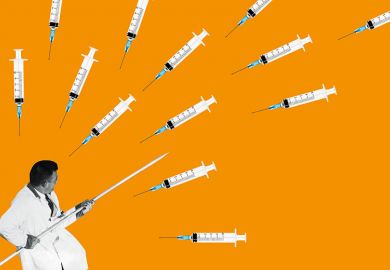What can voodoo dolls tell us about the public’s distrust of, and aggression towards, scientists? A new paper has attempted to find out.
Despite a growing fear that global attitudes have hardened towards scientific research, including instances of violence, “virtually nothing is known” about those likely to attack scientists, according to the study, published in Scientific Reports.
The paper, which examined about 750 responses across two different studies, claims to be the first to identify factors associated with an increased likelihood of harassing scientists.
Researchers tested their theories by offering participants a bonus payment of £1, which they could gift to themselves or donate to the Union of Concerned Scientists, and by asking them to sign a petition against the harassment of scientists.
Out of the total of £359 offered, participants opted to donate £69.79. The study found that political ideology was the best predictor for who would donate, with right-wing individuals contributing less.
The paper also asked those taking part to express their aggression by sticking pins in a digital voodoo doll of a stereotypical scientist – an “old-age male with a lab coat and equipment”.
Participants were asked to “release negative energy” by clicking their mouse, with a higher number of “pins” indicative of more aggressive behaviour. It found significant positive correlations with five variables – conspiracy mentality, science cynicism, relative deprivation, threat, and attitudes toward harassment.
Lead author Vukašin Gligorić, a PhD researcher in the department of psychology at the University of Amsterdam, said across the two studies, distrusting worldviews, political ideology, and perception of threat were associated with more approving attitudes toward scientists’ harassment.
Notably, the paper found that science cynicism – the belief that scientists are incompetent and corrupt – also drives approval of scientists’ harassment.
In addition, perceiving scientists as threatening, as well as dark personality traits, such as psychopathy and narcissism, contributed to approving harm.
The paper concluded that highlighting reasons why people should trust scientists and not be threatened by them is the most promising way to counter such behaviour.
The anti-science movement is a growing trend in some countries, Gligorić told Times Higher Education.
And he said that changing these attitudes will be challenging because scientists are viewed as part of the “establishment” which many people around the world are dissatisfied with.
“To address this, I believe scientists should engage more directly with the public…rather than for private or corporate interests, which erode trust.
“Ultimately, people are cynical about the political and economic systems we live in, and they sometimes blame scientists as part of that system. Therefore, scientists should also be critical of and work to improve the system itself.”
Register to continue
Why register?
- Registration is free and only takes a moment
- Once registered, you can read 3 articles a month
- Sign up for our newsletter
Subscribe
Or subscribe for unlimited access to:
- Unlimited access to news, views, insights & reviews
- Digital editions
- Digital access to THE’s university and college rankings analysis
Already registered or a current subscriber?








